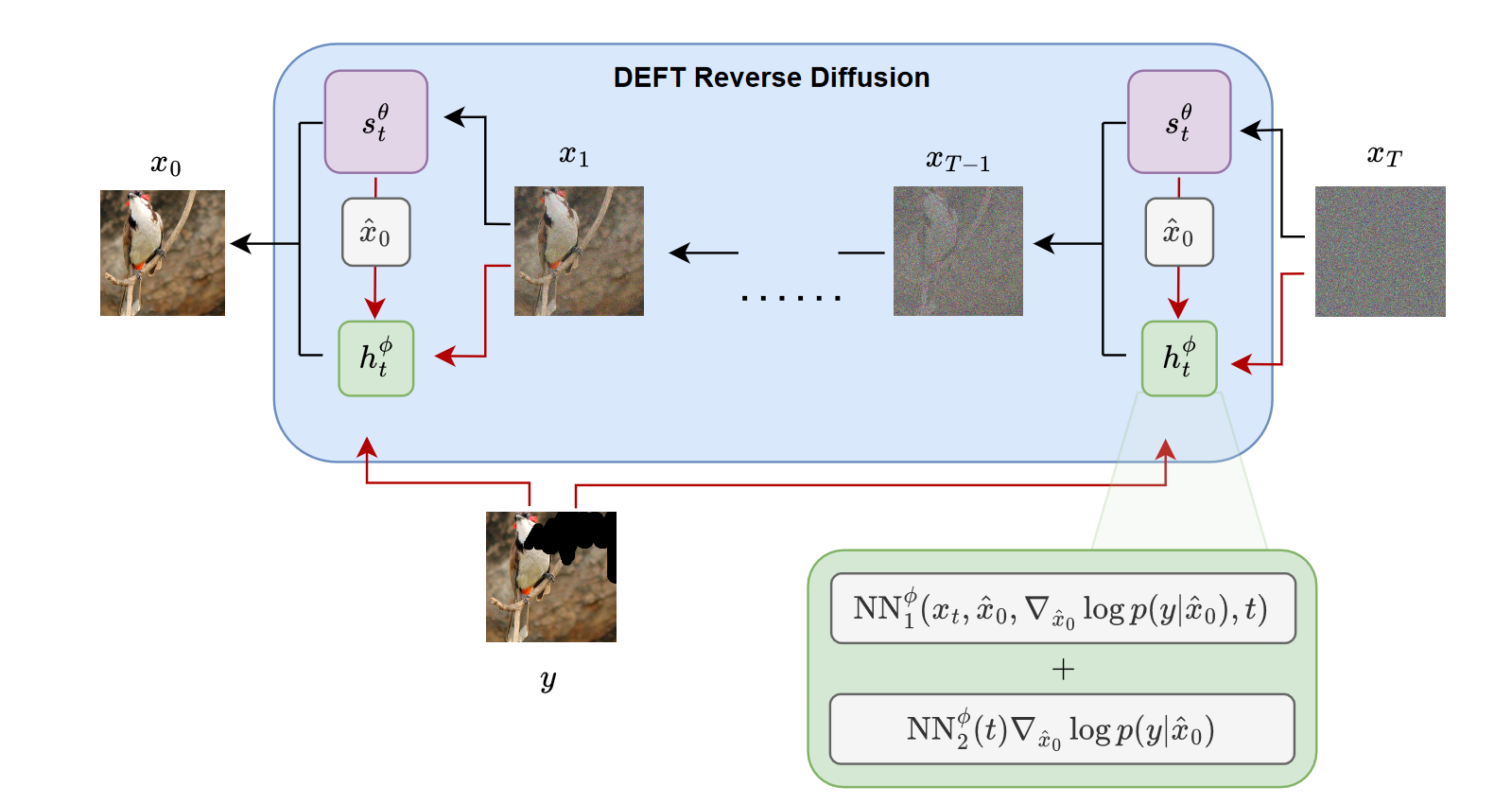Alexander Denker*, Francisco Vargas*, Shreyas Padhy*, Kieran Didi*, Simon Mathis*, Vincent Dutordoir, Riccardo Barbano, Emile Mathieu, Urszula Julia Komorowska, Pietro Lio
This repository will contain the implementation of DEFT as a fork of RED-diff.
The branch refactor is up to date.
Generative modelling paradigms based on denoising diffusion processes have emerged as a leading candidate for conditional sampling in inverse problems. In many real-world applications, we often have access to large, expensively trained unconditional diffusion models, which we aim to exploit for improving conditional sampling. Most recent approaches are motivated heuristically and lack a unifying framework, obscuring connections between them. Further, they often suffer from issues such as being very sensitive to hyperparameters, being expensive to train or needing access to weights hidden behind a closed API. In this work, we unify conditional training and sampling using the mathematically well-understood Doob’s h-transform. This new perspective allows us to unify many existing methods under a common umbrella. Under this framework, we propose DEFT (Doob’s h-transform Efficient FineTuning), a new approach for conditional generation that simply fine-tunes a very small network to quickly learn the conditional h-transform, while keeping the larger unconditional network unchanged. DEFT is much faster than existing baselines while achieving state-of-the-art performance across a variety of linear and non-linear benchmarks. On image reconstruction tasks, we achieve speedups of up to 1.6x, while having the best perceptual quality on natural images and reconstruction performance on medical images.
First, we install uv to manage all dependencies. See the uv documentation for more details. As an example on macOS and Linux, you can run
curl -LsSf https://astral.sh/uv/install.sh | shOnce uv is installed, you can run uv sync to install all dependencies, which will create a .venv in the directory. Now, for running any python script, you can run uv run <script> <args>.
uv run main.py \
algo=deft \
algo.deg=sr4 \
exp.name=sr4_deft \
algo.finetune_args.batch_size=16 \
algo.finetune_args.epochs=200 \
algo.finetune_args.lr=0.0005 \
algo.val_args.batch_size=10 \
algo.val_args.sample_freq=5 \
exp.overwrite=True \
exp.samples_root=samples \
exp.save_deg=True \
exp.save_evolution=True \
exp.save_ori=True \
exp.seed=3 \
exp.smoke_test=-1 \
htransform_model.in_channels=9 \
htransform_model.num_channels=32 \
htransform_model.num_head_channels=16 \
htransform_model.out_channels=3 \
likelihood.forward_op.noise_std=0.0 \
likelihood.forward_op.scale=4.0 \
loader=imagenet256_ddrmpp \
loader.batch_size=10 \
dist.num_processes_per_node=1python python run_supervised_finetuning.py --config configs/default_config.py:finetuning:imagenet:inp --config.finetune_model_config.in_channels 13 --config.forward_op.noise_std 0.0 --config.wandb.log --config.wandb.name "finetuning, inp" --config.finetune_model_config.use_residual --config.training.lr_annealing --config.dataset.root "path/to/imagenet
If you find this work helpful please cite:
@article{denker2024deft,
title={DEFT: Efficient Finetuning of Conditional Diffusion Models by Learning the Generalised $h$-transform},
author={Denker, Alexander and Vargas, Francisco and Padhy, Shreyas and Didi, Kieran and Mathis, Simon and Dutordoir, Vincent and Barbano, Riccardo and Mathieu, Emile and Komorowska, Urszula Julia and Lio, Pietro},
journal={arXiv preprint arXiv:2406.01781},
year={2024}
}
